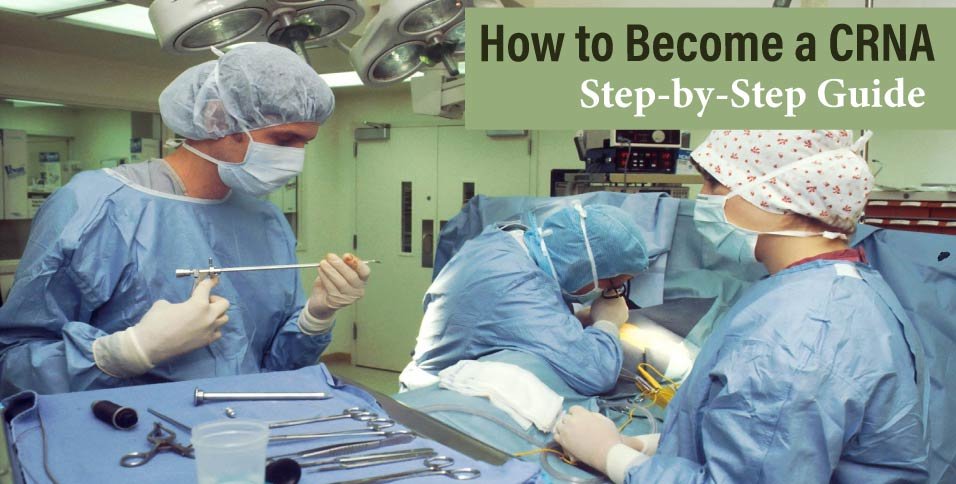Nursing is one of those occupations that allows you to develop a rewarding career and build relationships with people and patients in the healthcare industry.
For most individuals, nursing is a stimulating career choice because of the vast array of opportunities for career development. Besides, anesthesia is a groundbreaking invention in healthcare. The ability to prevent patients from feeling pain during surgeries has led to many significant improvements in surgical and other treatments.
Therefore, if you are passionate about making your patients feel comfortable, pain-free, and safe as they undergo rigorous medical procedures, then the CRNA career path is right for you. This article will provide a step-by-step guide to becoming a successful CRNA.
Who is a CRNA?
A CRNA (Certified Registered Nurse Anesthetist) is an advanced practice registered nurse who is a professional at administering anesthesia to patients. This person is also skilled at providing critical care to patients at some of their most significant times (during surgery).
Furthermore, some nurse anesthetists in many states can perform surgeries without the supervision of a doctor due to the rigorous training and years of experience required to become a CRNA.
Some of the daily responsibilities of the CRNA include:
- Educating patients on what to expect with anesthesia, including the side effects,
- Administering spinal, local, and general anesthetics.
- Assisting patients with their post-anesthesia recovery.
- Formulating an anesthesia care plan for every patient.
This role is a very delicate one and requires extensive experience and education. However, if you have a strong passion for healthcare and can thrive in a fast-paced setting, the journey will be worth it. The guide below will show you the steps you need to take to become a successful nurse anesthetist.
Step 1: Obtain a BSN degree
The first step to becoming a nurse anesthetist is to enroll in a Bachelor of Science in Nursing program and obtain your BSN degree. Search for accredited schools with the latest training tools and support systems for transitioning students.
The primary purpose of your BSN program is to give you a thorough lesson on the various aspects of nursing. Most of your classes will assess care for different medical conditions and patients.
The BSN program is a four-year undergraduate program focusing on medical science topics like human development, anatomy, and microbiology. It aims to develop your understanding of human body systems so you can apply proper anesthesia.
Finally, your BSN program will end with clinical rotations to help you practice what you learned in class. Maintain a 3.0 GPA to increase your chances of applying for a CRNA degree.
Step 2: Pass Your NCLEX-RN Exam
To become a nurse anesthetist, you must first become a licensed registered nurse. A certified registered nurse has passed the NCLEX-RN (National Council Licensure Examination for Registered Nurses).
This exam is computer-adaptive, meaning the amount of time it takes and the number of questions you will need to answer will depend on the number of questions you get correctly. You can take your NCLEX-RN, where you plan to practice as a nurse.
Step 3: Gain work Experience in Critical Care as a Licensed Registered Nurse

Once you get your license, you must gain work experience as a practicing nurse anesthetist. One of the best ways to do that is to get a job in critical care. This job will give you a strong foundation for managing, assessing and caring for critically ill patients.
Besides, to become a CRNA, you need at least one year of work experience as a licensed registered nurse in critical care. Working in urgent care will help you develop skills in administering medication, managing airways, and monitoring vital signs to help you perform your position as a nurse anesthetist.
Step 4: Earn a Graduate Degree
Nurse anesthetists have a specialized role that requires them to complete a graduate program to advance their skills. As an aspiring CRNA, you should look for graduate programs that have the recognition of the Council of Accreditation of Nurse Anesthesia Education Programs.
Enrolling in a graduate program like the MSN (Master of Science in Nursing) will offer you an opportunity to have a financially rewarding and fulfilling career in healthcare. It will also provide you with advanced training in the practices and principles of anesthesia.
Your graduate program should take at least two years, and you can either take an online class or opt for in-person anesthesia-focused MSN programs at nursing schools worldwide.
Step 5: Pass a CRNA National Certification Exam
Once you have completed all necessary educational requirements and gained adequate work experience, you can take the certification exam to become a CRNA. You have to pass the exam by the National Board of Certification and Recertification of Nurse Anesthetists (NBCRNA).
The computer-based exam lasts three hours and consists of 100–170 questions. According to the examining body, NBCRNA, the first-time pass rate for the exam was 84.3% in 2022.
Step 6: Maintain Your Role
Once you have passed your certification exam, you can practice as a certified nurse anesthetist. However, you must meet several educational requirements every four years to keep your CRNA certification updated.
Furthermore, you must complete an in-depth assessment exam every eight years. While the rules might seem strict, they are vital to ensuring you stay on top of your field regarding anesthetic advancements and trends. Doing this will lead to safer medical procedures and patients.
Conclusion

Becoming a nurse anesthetist can seem impossible to surpass, but it is an enriching career path. With enough hard work and dedication, you can achieve your goal of becoming a CRNA. Nurse anesthetists also make up to $300,000 annually, which is quite attractive compared to other fields.
The steps in this article show that becoming a CRNA requires rigorous preparation, gaining high-quality education and work experience, and obtaining the necessary licenses and certifications.
Despite the pressure of being a certified registered nurse anesthetist, the benefits make the career worth it. Not only will you have the opportunity to make the lives of your patients pain-free and safe, but you’ll also gain a fantastic and fulfilling life along the way.
Also Read: 5 Ways Medical Institutions can Bring Quality in Healthcare












